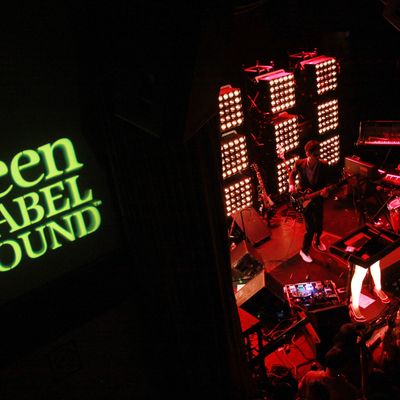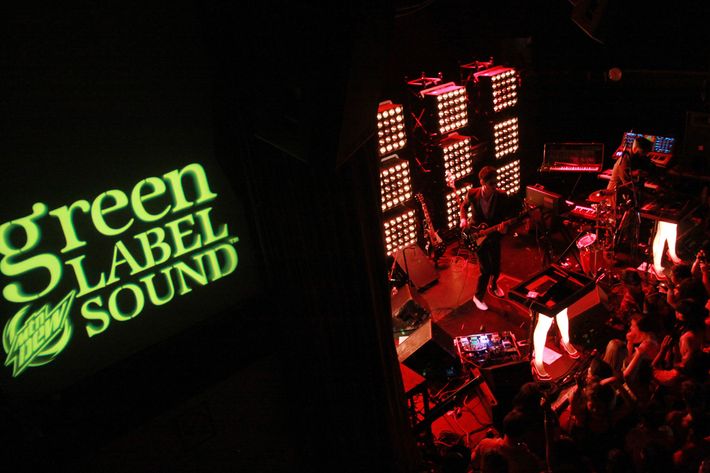

On July 12, Chicago retro-rap duo the Cool Kids released their debut album, When Fish Ride Bicycles. On its own, that is not a particularly notable fact. That the album was the first full-length release from Green Label Sound, though — Mountain Dew’s in-house record label — deserves a touch more scrutiny.
So — why the hell does Mountain Dew have a record label?
“Consumers are smarter,” explains Hudson Sullivan, Mountain Dew’s, um, “brand manager.” “The last thing we want is to look like we’re paying someone to drink our product on-camera. We want to create genuine loyalty.” Sure, sure. But why music? Credit that to the heightened competition in the “extreme bro” market. With the likes of Red Bull, Rockstar, Monster, AMP, and a million other unfortunately named energy drinks — not to mention the alcohol-imbued Four Loko and its ilk — hijacking the focus in the field away from regular old soda, Mountain Dew decided to latch on to a different association. Here’s Sullivan’s sales pitch: “We’ve moved away from the tagline ‘Do the Dew” to ‘It’s Different on the Mountain.’ [The idea is] we’re different than any other soda out there. Most people don’t relate to jumping out of an airplane on a snowboard but can relate to finding a new band or a new song, these highs we experience every day. Chromeo, Cool Kids, Theophilus London, MNDR” — all of whom have released singles or more via Green Label Sound — “they reflect our sensibility. They define their own genre.”
Scoffing yet? That’s understandable. Aren’t the aforementioned smart consumers smart enough to laugh off Mountain Dew’s attempt at branding itself as “hip”? In the early stages of the project, certainly. But the Dew’s working a long con, and their strategy is sound. Ready? Green Label Sound doesn’t make a penny off its artists. They have no financial stake in their acts whatsoever — meaning they have no interest in dabbling to make sure that their acts churn out commercially viable music. Paradoxically, an offshoot of the giant Pepsico corporation cares less than even the most DIY indie label on the planet about making money off music. “We want to take advantage of their cool factor, and at the same time give them assets that a traditional record label won’t be able to provide anymore,” Sullivan says. “The artists are getting to keep their artistic integrity.”
There’s nothing altruistic about it. Mountain Dew just knows that if they tried to co-opt indie artists for their own means in a more blatant fashion — like, say, having the Cool Kids drink the product on-camera — it would fail. They give the Cool Kids money and complete creative control because that’s what they’ve decided is the most viable marketing strategy.
And it’s not hard to see how that kind of thinking would be attractive to talent. “It was no Green Label Sound exec sitting in the studio, telling us what to do,” says the Cool Kid’s Mikey Rocks. “They’re just like, ‘go make the songs, bring us the songs, and we’ll put ’em out.’” As far as letting some of his act’s hip sheen slide onto Mountain Dew, Mikey is willing and able: “We’re a group that dictates what’s gonna be cool. And for a big brand to allow us to be their cool factor? It’s definitely a teeter-totter situation: We get the backing we need, and they get the validation they need.”
But how far does the freedom go? What if the Cool Kids all of a sudden wanted to put out a song explicating their unquenchable thirst for Diet Cherry Vanilla Dr Pepper? “There are certain subject matters that we want them to stay away from because of the brand relationship,” concedes Jeff Tammes, EVP for Cornerstone, a creative agency that has developed Green Label Sound alongside Mountain Dew. “Our relationships are pretty non-restricting, but certain artists represent themselves in a way we’d feel that’s not right for us to work with. It’s hard to pinpoint something specific to sever those ties.” He adds, not unconvincingly, “but I don’t think that’s necessarily different than anybody else.”
Cornerstone has also worked with Converse in developing Rubber Tracks, a recently opened studio in Williamsburg, Brooklyn, that offers studio time free of charge to up-and-coming acts. It’s another nifty branding idea, although Converse has it a bit easier in that department: As the company has repeatedly pointed out in television and print ads, musicians have been independently choosing Chucks for quite some time now. Rubber Tracks will attempt to bolster the association, but, like Green Label Sound, the project itself has no designs on money-making. “We’re a footwear and apparel company,” Geoff Cottrill, Converse’s chief marketing officer, stresses repeatedly. “We’re not looking to break into the industry.” Basically, in the name of selling sneakers, they’re trying to promote some good vibes. Hopefully, Cotrill explains, the bands that come through Rubber Tracks will leave thinking, “Did what I’m wearing ever do this for me?”
So will projects like Green Label Sound and Rubber Tracks — corporate initiatives that don’t interfere in the actual music-making process — point to a new way forward for the industry? You won’t believe this, but the people behind those projects think that, yep, they will! “As the traditional industry continues to fall apart, brands are really looked to as a resource, an opportunity for artists,” Tammes says. “They can come in and provide the support that labels once did. It’s evolving.” Sullivan emphatically agrees: “I don’t see how an artist is going to able to launch a record without strategically partnering with a brand.”




